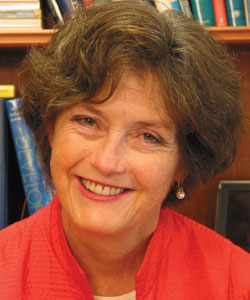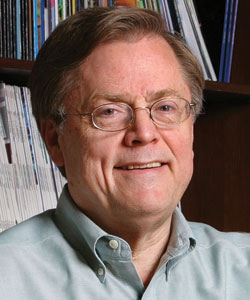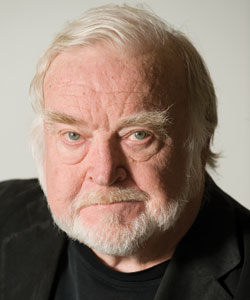Reflecting on a Lifetime of Achievement
As part of APS’s 25th Anniversary celebration, the Board of Directors is honoring 25 distinguished scientists who have had a profound impact on the field of psychological science over the past quarter century. Eight individuals have been selected to receive the James McKeen Cattell Fellow Award, honoring a lifetime of significant contributions to applied psychological research. The remaining 17 scientists are receiving the William James Fellow Award, which recognizes their significant intellectual contributions to the basic science of psychology. In this issue of the Observer, APS continues the series profiling three of these eminent scientists: Judy S. DeLoache, Bruce S. McEwen, and Mihaly Csikszentmihalyi.
 Judy S. DeLoache
Judy S. DeLoache
University of Virginia (retired)
William James Fellow Award
Judy S. DeLoache is a leading expert on children’s behavior, and is renowned for developing the dual representation theory of symbolic development. Her work has greatly advanced the understanding of children’s memory and reasoning. In an early research program, DeLoache developed a paradigm in which she hid an object in a scale model of a larger room to see if children could use what they knew about the hiding event in the model to find a larger version of the object hidden in the comparable place in the room. She observed that children two and a half years old unexpectedly failed this task and concluded that the problem was not a failure of memory, but of symbolic understanding. This work led to her seminal 1987 paper on children’s symbolic functioning published in Science.
In yet another groundbreaking paper published in Psychological Science, she provided an important theoretical test of her dual representation theory. In the paper, she told very young children that she had a shrinking machine that could make a large room contract into a scale model of the room. Convinced that the small model was a shrunken version of the larger room, children two and a half years old succeeded in the hide-and-seek task. This famous article was selected by the Society for Research in Child Development as one of twenty studies that fascinated child psychology.
In another high-profile study, DeLoache found that infants learned no more words from a best-selling line of DVDs for babies than did a control group. She’s also studied other child development areas, including perception of photographs and learning from picture books. And perhaps most famously, her observation that children sometimes attempt to sit in the small furniture in her scale models led to another publication in Science, in 2004, documenting the existence of very young children’s scale errors.
DeLoache’s willingness to explore new research topics coupled with her keen sense of observation is visible in all of her work, and explains why she has been so prolific in various areas of research, including eyewitness testimony and humans’ common fear of snakes. Her impact on the field of developmental psychology will last beyond the scope of her career, and will continue to influence researchers young and old for years to come.
 Bruce S. McEwen
Bruce S. McEwen
The Rockefeller University
William James Fellow Award
Bruce S. McEwen has spent more than 40 years studying how hormones regulate the brain and nervous system. His neuroendocrinology lab showed that stress hormones affect brain centers involved in learning and memory, emotion and mood control and has been at the forefront of research on the impact and mechanisms of stress effects on the brain. He has helped draw distinctions between good or adaptable forms of stress and toxic stress. McEwen has elucidated the ability of stress to alter the structure of the brain by showing how synapses and dendrites shrink in the hippocampus and prefrontal cortex or grow in the amygdala; his lab also rediscovered neurogenesis in the hippocampus and showed how it is affected by chronic stress. McEwen’s lab exemplifies an interdisciplinary approach; it combines behavioral analysis and measurements of hormone levels with neurochemical, morphological, neuropharmacological, cellular and molecular methodologies, and collaborative translational studies.
McEwen coined the term allostatic load, a concept that explains how stress systems that help the body survive can cause problems when overworked. This work has led to a realization that stress hormone effects are biphasic — protective in the short term and potentially damaging in the long term. And by focusing on sex hormones as regulators of structural plasticity in the adult brain, McEwen’s lab has raised awareness of the importance of studying gender differences in stress effects. Besides stressors that generate anxiety and learned helplessness, McEwen and his colleagues also investigate the neural and behavioral consequences of circadian disruption such as arises from shift work, jet lag, and sleep deprivation.
McEwen is the author or co-author of more than 900 scientific papers, and co-author of two books for the lay public. His is currently involved in the National Scientific Council on the Developing Child that investigates how early life stress can be ameliorated to minimize its lifelong consequences. McEwen’s research has contributed heavily to a new understanding of how the brain changes in structure and function during development and in adult life. His work has far-reaching implications for understanding the impact of stress on the brain and on human health in general.
Read Bruce S. McEwen’s reflection “The Brain on Stress: Toward an Integrative Approach to Brain, Body, and Behavior” in the November issue of Perspectives on Psychological Science.
 Mihaly Csikszentmihalyi
Mihaly Csikszentmihalyi
Claremont Graduate University
James McKeen Cattell Fellow Award
Mihaly Csikszentmihalyi has devoted his career to studying what makes people happy. His books and scientific research publications on creativity, innovation, and what makes life worth living are used extensively and widely cited across many disciplines and professions. His seminal work was reported in his bestselling 1990 book, Flow: The Psychology of Optimal Experience. He is the author of 13 other books and 225 research articles. Building on years of detailed research, Csikszentmihalyi created the term “flow” to describe the experience of being completely immersed in an activity for its own sake. Whether in creative arts, athletics, work, or spiritual practice, flow leads to a deep motivation to excel and triumph over limitation, he says. The happiness, he avers, lies in the challenge to transcend beyond one’s previous level of skills.
In the early 1970s, Csikszentmihalyi developed the Experience Sampling Method (ESM), a set of techniques designed to capture people’s behaviors, thoughts, and feelings as they occur. ESM became the core of flow research. When someone is in a state of flow, self-consciousness disappears and the sense of time becomes distorted, according to Csikszentmihalyi’s research. “An activity that produces such experiences is so gratifying that people are willing to do it for its own sake, with little concern for what they will get out of it, even when it is difficult or dangerous,” he once wrote.
Csikszentmihalyi steered behavioral research into an alternative direction. Until the late 20th century, most behavioral studies focused primarily on mental illness, aggression, and other human failings and pathologies. Csikszentmihalyi has showed us that it’s equally important to understand life satisfaction and achievement.





APS regularly opens certain online articles for discussion on our website. Effective February 2021, you must be a logged-in APS member to post comments. By posting a comment, you agree to our Community Guidelines and the display of your profile information, including your name and affiliation. Any opinions, findings, conclusions, or recommendations present in article comments are those of the writers and do not necessarily reflect the views of APS or the article’s author. For more information, please see our Community Guidelines.
Please login with your APS account to comment.